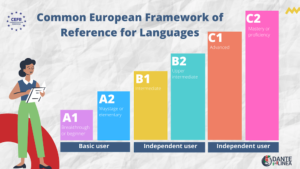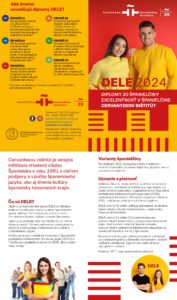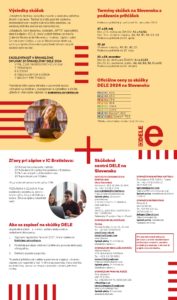DELE Exams for EISB Comunity
At the English International School of Bratislava (EISB), our mission extends beyond classroom education. We strive to provide meaningful opportunities to our school community, not only for academic growth but also for developing language and cultural skills that open doors in today’s globalized world. One way we fulfill this mission is by serving as a bridge between our students and the prestigious DELE exams, internationally recognized as a benchmark of excellence in Spanish proficiency as a foreign language. To learn more about these certificates, please read the following article.
What are the DELE Exams and Why are They Important?
The DELE exams, which stand for Diplomas of Spanish as a Foreign Language, are international certifications that validate the level of competence and mastery of the Spanish language for non-native speakers. These exams are issued by the Instituto Cervantes on behalf of the Spanish Ministry of Education and Professional Training, and they are internationally recognized by educational institutions, companies, and government organizations as a reliable test of proficiency in Spanish as a foreign language. Obtaining a DELE diploma can open many doors, whether it’s accessing educational opportunities in Spanish-speaking institutions, securing employment in international companies, or simply enhancing professional prospects.
Who organizes these exams?
The Instituto Cervantes is a Spanish public institution founded in 1991 with the purpose of promoting the teaching, study, and dissemination of the Spanish language and Hispanic cultures worldwide. With a presence in our city, Bratislava, Slovakia, the Instituto Cervantes offers a wide range of services, including Spanish courses, cultural programs, specialized libraries, certification exams like the DELE, and activities promoting Spanish and Hispanic-American culture. With branches in over 80 cities in more than 40 countries, the Instituto Cervantes plays a crucial role in promoting Spanish as the second most spoken language in the world and in fostering cultural exchange between Spanish-speaking nations and the rest of the world.
Who are the DELE Exams for?
The DELE exams are aimed at people of all ages and nationalities who wish to accredit their level of Spanish. From Primary students to professionals who need to demonstrate their language proficiency for work or academic purposes, anyone can take these exams.
What are the Levels of the DELE Exams?
The DELE exams are divided into six levels, ranging from A1 to C2, according to the CEFR (The Common European Framework of Reference for Languages). Each level evaluates the candidate’s language skills in areas such as listening comprehension, reading comprehension, written expression and interaction, and oral expression and interaction.
– **A1 and A2**: These levels assess the candidate’s ability to understand and use everyday expressions and basic phrases.
– **B1 and B2**: These levels measure the candidate’s ability to navigate everyday and professional situations, as well as to comprehend more complex texts.
– **C1 and C2**: These levels are designed to assess the advanced language competence of the candidate, allowing them to operate fluently in academic and professional contexts, as well as to comprehend specialized and abstract texts.

How a DELE exam looks like?
The DELE exams consist of several parts, each designed to assess different language skills. The main components of the DELE exams are:
- Listening Comprehension: This part evaluates the candidate’s ability to understand and extract information from audio recordings in Spanish. Candidates listen to a series of recordings and then answer questions related to them.
- Reading Comprehension: In this section, candidates must read a variety of texts in Spanish and answer questions about their content. The texts may include articles, advertisements, emails, among others.
- Writing Expression and Interaction: Candidates are required to write texts in Spanish that demonstrate their ability to communicate effectively in writing. This may include essays, letters, emails, or other types of writing.
- Oral Expression and Interaction: In this part, candidates engage in a conversation with an examiner or another candidate. They may also give an oral presentation on a specific topic. This section assesses the candidate’s ability to communicate effectively and fluently in Spanish.
These parts may vary slightly depending on the level of the DELE exam, but overall, they are all designed to evaluate the candidate’s proficiency in different aspects of the Spanish language.
EISB Students at Instituto Cervantes Bratislava
The field trip aimed to immerse our Spanish students in various aspects of Hispanic cultures. During our visit to the Cervantes Institute in Bratislava, students learned about its history, educational programs, and global role in promoting Spanish. They also engaged in fun activities focusing on Spanish geography and culture, practiced Spanish by associating cultural features with specific regions, and enjoyed a lively introduction to Spanish culture at the Aula Cervantes. Additionally, they appreciated Spanish fine arts in an exhibition, enriching their understanding of Spain’s cultural heritage. Read more here.
DELE in Bratislava: An Opportunity to Certify Your Spanish
For those wishing to certify their Spanish proficiency, the DELE exams represent an invaluable opportunity. The exams are managed by Aula Cervantes Bratislava and multiple dates, levels and locations are offered. The deadline to register for the DELE exams in Bratislava is April 3rd 2024, marking the final day to secure your participation in these exams, which cover all levels from A1 to C2. If you need more information, you can visit the following link.
From EISB, we are here to assist you in the registration process. You can email francisco.martinez@eisbratislava.org to receive assistance and guidance on how to complete your registration for the DELE exams. Get ready to demonstrate your Spanish proficiency and advance towards your personal and professional goals!




